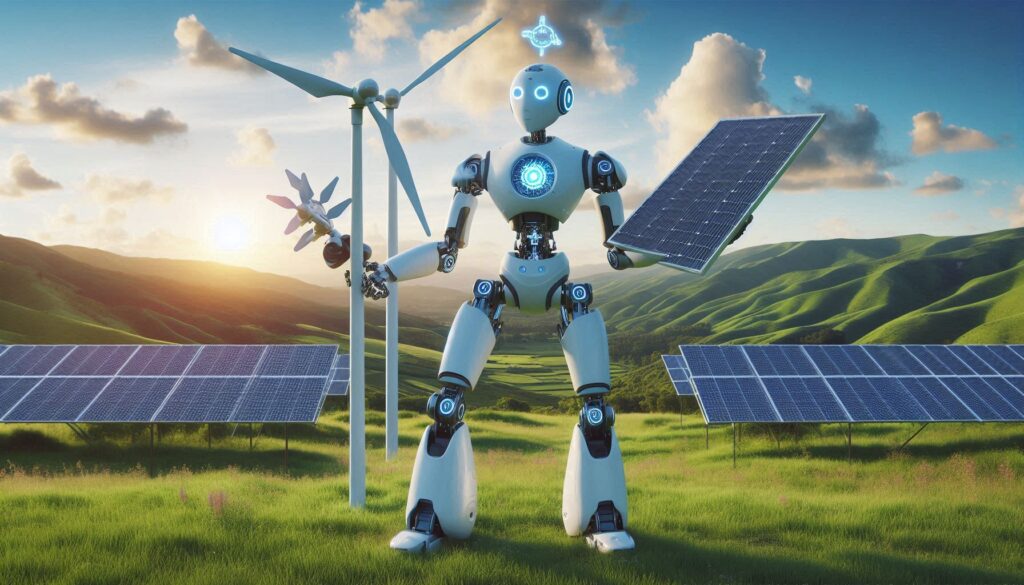
The use of artificial intelligence (AI) in the energy industry is transforming how we create, distribute, and use energy. AI is playing an important role in improving renewable energy systems and smart grids, allowing for a more efficient, sustainable, and dependable energy infrastructure. In this blog article, we’ll look at AI applications in the energy sector, including their benefits, problems, and potential future paths.
Renewable Energy Systems: Using AI for Optimization
Renewable energy technologies, such as solar and wind power, are becoming increasingly vital as the world moves toward a low-carbon economy. However, the intermittent nature of renewable energy sources creates substantial issues for grid stability and energy delivery. Artificial intelligence is being utilized to optimize renewable energy systems in numerous ways:
Predictive Maintenance
AI-powered predictive maintenance detects future equipment faults, minimizing downtime and improving overall efficiency. By analyzing sensor data from wind turbines or solar panels, AI systems may detect trends and abnormalities, allowing for preventive maintenance and reducing unexpected outages.
Performance Optimization
AI may improve the effectiveness of renewable energy systems by evaluating data from a variety of sources, such as weather forecasts, energy use, and equipment performance. This allows for the optimization of energy production, resulting in less energy waste and increased overall system efficiency.
Energy Storage Optimization
AI can improve energy storage technologies like batteries to guarantee that excess renewable energy is stored and used efficiently. This decreases energy waste while providing a more consistent and predictable energy source.
Smart Grids: AI-Powered Efficiency and Reliability
Smart grids are sophisticated energy distribution systems that use IoT sensors, advanced analytics, and artificial intelligence to control energy distribution and consumption in real-time. Artificial intelligence is being utilized to optimize smart grids in numerous ways:
Load Forecasting
AI-powered load forecasting allows utilities to precisely estimate energy demand, allowing for more efficient energy distribution and lowering the chance of power outages.
Grid Optimization
AI may improve grid operations by processing data from a variety of sources, such as weather predictions, energy consumption, and system problems. This allows utilities to discover inefficiencies and optimize energy delivery in real-time.
Fault Detection and Prediction
AI-powered fault detection and prediction allow utilities to discover possible grid defects before they occur, lowering the chance of power outages and allowing for preventive maintenance.
Challenges and Limitations of AI in Energy
While artificial intelligence is altering the energy sector, there are significant hurdles and restrictions to its deployment.
Data Quality and Availability.
AI algorithms rely on high-quality, dependable data to produce accurate forecasts and improvements. However, energy industry data is frequently fragmented, insufficient, or erroneous, creating substantial barriers to AI deployment.
Cybersecurity Risks
The energy sector’s increasing dependence on AI and IoT devices raises substantial cybersecurity concerns, including the possibility of data breaches and grid disruptions.
Regulatory frameworks
The energy business is extensively regulated, and implementing AI needs legal frameworks that encourage innovation and experimentation.
Future Directions: The AI-Driven Energy Transition
The integration of AI in the energy industry is likely to increase further, driven by the need for a low-carbon economy and the rising use of renewable energy. Future directions for artificial intelligence in energy include:
Autonomous Energy Systems
The creation of autonomous energy systems that can run on their own, utilizing artificial intelligence to optimize energy distribution and consumption.
Edge AI for real-time optimization.
The application of edge AI to provide real-time energy system optimization, lowering latency and increasing overall efficiency.
AI-Powered Energy Storage
The creation of AI-powered energy storage systems that can optimize energy storage and release, results in a more stable and dependable energy supply.
Conclusion
The incorporation of AI into the energy industry is transforming how we create, distribute, and use energy. AI is allowing a more efficient, sustainable, and dependable energy infrastructure through the optimization of renewable energy systems and smart grids. While there are hurdles and limitations to its implementation, the advantages of AI in energy are apparent. As the energy sector evolves, artificial intelligence (AI) will become increasingly vital in allowing a low-carbon economy and a sustainable energy future.